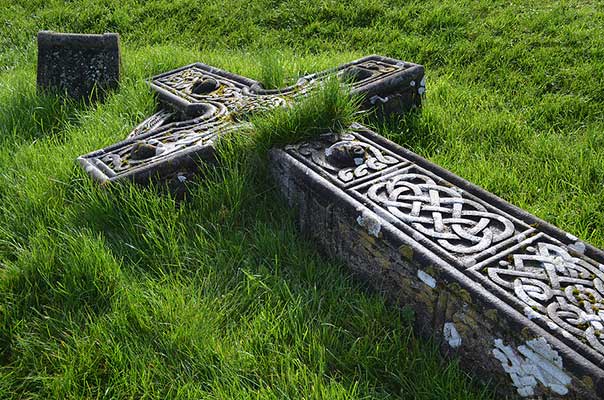For most of the year, Ireland is a bit wet. Somehow, even in high summer, when you pack up a picnic, birds singing in the trees, flowers nodding lazily in the heat across the fields – moisture still finds its way into your clothes, the panes of glass in the car, the sandwiches in the picnic basket and pretty much everything else.
If high summer – which here means anything between 12 and 23 degrees – can bring these kinds of challenges, imagine what we have to deal with at this time of year – in late winter and early spring. Sopping flowers, drenched lawns, scummy moss that continually grows in corners of the garden no matter what you try and do about it, dripping gutters, wet mists and over all – even when the sun is shining – a feeling in your bones that the next clammy creep of water within the atmosphere is never that far away from seeping through your jacket.
In Ireland, when there are days like this, the people of the country would talk about it being “a soft day”. Kind of like a day that by 2pm, had not quite made up its mind what it was going to be and so had settled into the rhythm of, yet again, being a fudgy mixture between warm and cold, wet and dry and light and dark. At the middle of this time – today the first of February in fact – the Celtic people would celebrate a festival.
A pagan ritual, the festival of “Imbolc” marked the departure of the worst dark days of winter, and the approach of the warmer days of spring. In fact, the ancient Celtic calendar was very different from our more precisely defined solar one. Instead of waiting for the advent of the equinox (of which they were very well aware) on the 21st of March to herald the beginning of spring, the Celtic people began their celebration on the 1st of February and the Irish Celtic and now secular calendar has continued to follow their lead – celebrating important feasts on February the first.
The Irish abbess Brigid, of Kildare venerated in the Roman Catholic, Eastern Orthodox and Anglican communions is remembered on this date. A near contemporary of Patrick – Ireland’s great patron – Brigid was a woman who did much to bring the Christian faith to Ireland. She founded abbeys, organised communities of religious women and took much care for the poor.
Stories about her life stress her sanctity but also her practicality – dealing with the world as she found it and working with men and women to bring faith not just to the higher classes in Ireland, but also to the common people. Perhaps as a symbol of her importance, perhaps as a measure of practicality, perhaps as a reflection of that “seepage” in which world and church are so continually intertwined – the church in Ireland placed remembrance of Brigid on February the 1st, the same day as the pagan festival “Imbolc”.
Perhaps seeking to arrest the force which would turn people’s hearts and minds to a vague and superstitious veneration of nature, fertility and cyclical seasons the early Irish church chose a woman who served God with her life and her gifts as a simple, powerful reminder that it is God’s action through the lives of men and women which brings change. Wholeness, completeness and the fructifying power of God’s action in the world are – for some mystical reason of which we are unaware – mediated through the lives of men and women.
The historic Brigid is a complex figure. Many legends and stories around her life have the ring more of popular folk tales than a real person; a woman who performed incredible feats of supernatural power to withstand the evil pagan forces of the day. Others would say that Brigid never existed at all, that the figure written of in several 8th Century biographies is a reimagination of an ancient Celtic goddess whom later monks wished to Christianise.
Likely, the truth is far simpler and thus far more powerful than either extreme. A strong woman in the 5th Century, who wished to spread the Christian message in a newly evangelised land by gathering others together in a rhythm of prayer, charitable acts and community living is not so hard to imagine.
As men and women who believe in God’s power to act in the world through his Holy Spirit, it is also not so hard to imagine that this simple goal could have been attended by miraculous signs through God’s power. Certainly, the speed and thoroughness with which Ireland was converted during the time of Brigid is in itself an example of God’s power working in the world.
As children of the post truth age, as 21st Century Christians, indeed as human beings we crave straight lines. Looking back into history, we seek the clear light of fact to guide our thoughts and decisions. Hard and soft, dark and light, wet and dry – these are the categories into which we crave to divide the world and the day.
On Brigid’s day, the first of February, the world outside my window affords no such certainty. The Celtic calendar tells me that today, it is now spring, that the flowers will bloom yet, that the temperature will rise soon, and all will be better. The windowpane, streaked and bubbled with condensation – despite our new double-glazed windows – tells me a different story. There is “in-betweenness” yet to come. There is a seepage yet to be endured, there is a “not yet-ness” I can see in the weather that reminds me of my own life.

Four centuries before her birth, the apostle Paul wrote to Brigid’s ancestors in faith in the Roman church quoting from Psalm 14 to tell them that “all men, both Jews and Greeks, are under the power of sin, as it is written: ‘None is righteous, no, not one; no one understands, no one seeks for God. All have turned aside, together they have gone wrong; no one does good, not even one’. The picture, as Paul quotes from the Old Testament, is bleak. All are culpable, all have fallen, all will die. A hard, clear line. It is not a soft day in Rome. Thankfully, the apostle continues. He says that, although all have fallen “now, the righteousness of God has been manifested…the righteousness of God through faith in Jesus Christ for all who believe”.
As the Christian dawn spread over Ireland all those years ago, it was through women like Brigid – hard, clear-headed, practical and yet visionary – that the beautiful truth emerged. There is a clear line, there is a hard truth. All have fallen, and all are in need. Yet, there is a dawn, there is a springtime and there is a saviour.
What must it have felt to those pagans so long ago, so sure of their own need for God that they would worship the very turn of the season, to be told and to understand that there was a payment, a righteousness and a salvation that they could receive if they would but believe. If they would embrace the hard truth that they were sinners and cry out for forgiveness, there would be another hard line to cut through the softness and stop the seepage – “the righteousness of God through faith in Jesus Christ for all who believed”.
As I left the house and my article behind, the persistent rain had again begun to fall – spreading over everything like a fine, covering of clingfilm. Later on though, the sun came out and shone through the rain.
Spring is not far away.
Tadhg Lynch is a member of the Servants of the Word, a missionary brotherhood of men living single for the Lord, and a Mission Director for Kairos in Europe and the Middle-East, an international outreach to young people. Tadhg is originally from Nazareth Community, Dublin, Ireland.



